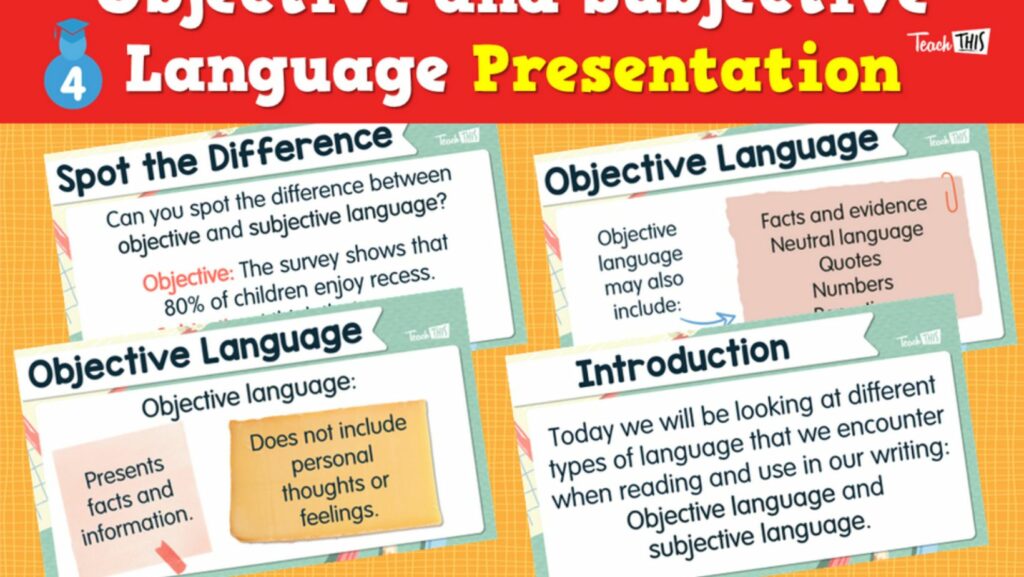
Language is Most Objective When Based Upon
When it comes to objectivity in language, the foundation upon which it is built plays a crucial role language is most objective when based upon. The objectivity of language is most pronounced when it is firmly grounded in established principles and structures. By adhering to a solid framework, language can transcend biases and subjectivity, allowing for clear and precise communication.

Understanding the significance of basing language upon reliable sources and rules is essential for fostering effective communication language is most objective when based upon. Whether it’s grammar rules, linguistic conventions, or established vocabulary, a strong foundation enhances the objectivity of language. By delving into the roots of language and embracing established standards, one can navigate the complexities of communication with confidence and clarity.
In the following article, we will explore how language achieves its highest level of objectivity when rooted in established principles. By examining the importance of a solid linguistic foundation, we can appreciate the role it plays in shaping our interactions and perceptions.
The Importance of Objectivity in Language
Objectivity in language is paramount for effective communication. It ensures that messages are conveyed clearly, without bias or personal influence, leading to accurate understanding and interpretation by all parties involved.
Defining Objectivity in Communication
In communication, objectivity refers to the impartiality and neutrality of language use. It involves presenting information based on facts and evidence rather than personal feelings or opinions. By maintaining objectivity, individuals can communicate information in a transparent and unbiased manner, fostering trust and credibility in their interactions.

Why Objectivity Matters
Objectivity is crucial in language as it promotes fairness and accuracy in conveying information. When language is objective, it minimizes the risk of misinterpretation and misunderstandings, allowing for more effective communication exchanges. By adhering to objective language practices, individuals can ensure that their messages are received as intended, enhancing overall clarity and precision in communication.
Foundations of Objective Language
Understanding the foundations of objective language is crucial for effective communication. By aligning language with specific aspects such as science and the legal system, individuals can enhance the clarity and impartiality of their messages.
Language and Science
In the realm of science, language serves as a precise tool for conveying information. Scientific language relies on empirical evidence, precise terminology, and standardized conventions to ensure objectivity. By adopting a structured and factual approach to language, scientific communication minimizes ambiguity and maximizes clarity.
Language in the Legal System
Language plays a critical role in the legal system by establishing a framework for interpreting laws and regulations. Legal language is characterized by its specificity, accuracy, and adherence to established legal principles. Objectivity in legal language is essential for drafting contracts, interpreting statutes, and resolving disputes in a fair and impartial manner.
Challenges to Achieving Objectivity
Bias and Subjectivity in Language Use
Language, though a powerful tool for communication, can be susceptible to bias and subjectivity. Individuals’ personal experiences, beliefs, and cultural backgrounds can influence the way they perceive and express information, leading to subjective interpretations. One may unknowingly infuse bias into their language, affecting the objectivity of their message.

Confronting Cultural Differences
Cultural differences present a significant challenge to achieving objectivity in language. Diverse cultural perspectives shape individuals’ communication styles, values, and norms, impacting how language is used and understood. Misinterpretations may arise when communicating across cultures, as nuances, idioms, and connotations can vary widely. Adapting language to bridge these cultural gaps while maintaining objectivity requires sensitivity and awareness of cultural diversity.
Educational Approaches
In educational settings, fostering objective language involves teaching critical thinking skills and emphasizing evidence-based arguments. By encouraging students to support their viewpoints with facts rather than personal beliefs, educators can instill the importance of objectivity in communication. Furthermore, promoting diverse perspectives and facilitating respectful dialogue can help cultivate a mindset that values impartiality in language use.
Policies and Standards in Professional Fields
In professional environments, implementing clear guidelines and standards for communication can reinforce the use of objective language. Establishing protocols for fact-checking, verification of sources, and neutral phrasing can help ensure that information is conveyed without bias. By integrating these practices into professional development programs and organizational policies, individuals can adhere to principles of objectivity in their language choices, contributing to more effective and transparent communication.
